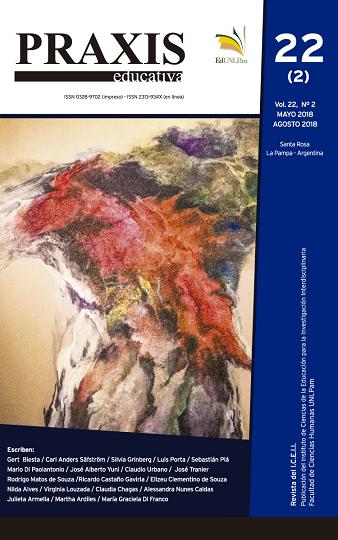Conversations with Gert Biesta and Carl Anders Säfström
DOI:
https://doi.org/10.19137/praxiseducativa-2018-220211Keywords:
cotidians, educational networks, educational spaces-times, learning-teaching processes, practicestheoriesAbstract
In the present article, we propose to talk with Gert Biesta and Carl Andres Säfström from a manifesto of their authorship on the position they have about the school in the contemporaneity. We point out some ideas that are at the base of the works that we develop and in the current of research to which we are affiliated –research with the daily ones–, that is, educational networks and conceptual characters. Then, we present some positions that we understand as differentiated from those defended by these authors: the relationships between practices and theories, the articulations between educational spaces and times and the idea that the processes of ‘teaching learning’ happen all the time, in a movement which includes the “still is not” in the negotiation between “what is” and what “is not yet”.
Downloads
References
Alves, N(2010). “Redes educativas ‘dentrofora’ das escolas, exemplificadaspela formação de professores”. En: Santos,L; Dalben,Â; Diniz,J;Leal,L. (comp.). Convergências e tensões no campo da formação e do trabalho docente: Currículo, Ensino de Educação Física, Ensino de Geografia, Ensino de História, Escola, Família e Comunidade. 1.ed.Belo Horizonte/ MG: Autêntica.
Alves, N (2008). “Decifrando o pergaminho – os cotidianos das escolasnas lógicas das redes cotidianas”. In: Alves, N y Oliveira, I (comp). Pesquisa nos/dos/com os cotidianos das escolas sobre redes de saberes. 3. ed. Rio de Janeiro: DP&A.
Alves, N (2003). “Cultura e cotidiano escolar”.Revista Brasileira de Educação. Rio de Janeiro, ANPEd, Vol. 23, Nº23. 62-74.
Alves, N (2001). “Redes cotidianas de conhecimentos e valores nasrelaçõescom a tecnologia”. In: I Seminário Internacional – As redes cotidianas de conhecimento e tecnologia. Rio de Janeiro, UERJ (CDROM).
Bhabha, H. (2005). O local da cultura. Belo Horizonte, Ed. UFMG.
Biesta, G. y Säfström, C.A. (2011).A Manifiesto for Education. Policy Futures in Education Año. 9 Nº 5, pp.540-547
Bloch, E. (1995). Theprinciple of hope. Cambridge, Mass: MIT Press.
De Certeau, M. (2012). A invenção do cotidiano – 1. Artes de fazer. Petrópolis/RJ: Vozes.
Deleuze, G. (2007). Francis Bacon – lógica da sensação. Rio de Janeiro: Zahar.
Deleuze, G. (2003). Proust e os signos. Rio de Janeiro: Forense Universitária.
Deleuze, G. (1985) Imagem-tempo (Cinema 2).S. Paulo: Brasiliense.
Deleuze, G y Guattari, F. (1992). Os personagensconceituais. In Deleuze, G yGuattari, F. O que é filosofia? Rio de Janeiro: Ed. 34: 81-109.
Deleuze, G y Guattari, F. (2014). Kafka – por uma literatura menor. Belo Horizonte/MG: Autêntica.
Esteban, M.T.(2000).“Avaliação: ato tecido pelas imprecisões do cotidiano”. In: educaçãonão é privilégio - 23ª Reunião Anual da ANPEd, 2000, Caxambu. 23ª Reunião Anual da ANPED (CD-ROM).
Esteban, M.T (2001).O que sabe quem erra? Reflexões sobre a avaliação e fracasso escolar. Rio de Janeiro: DP&A.
Ferreira, A (2010). Dicionário da Língua Portuguesa.5. ed. Curitiba: Positivo.
Freire, P. (1994). Professora sim, tianão. São Paulo: Olhod’Àgua.
Garcia, R.eAlves, N. (2002). A necessidade de orientaçãocoletiva nos estudos sobre os cotidianos – duasexperiências. In Bianchetti, L.e Machado, A.M (comp). A bússola de escrever. S. Paulo/Florianópolis: Cortez/ EdUFSC.
Libâneo, J.C. (2013). Didática. São Paulo: Cortez.
Maturana, H. (2001). Cognição, ciência e vida cotidiana. Belo Horizonte/MG: Editora da UFMG.
Oliveira, I. (2012). “Currículos e pesquisas com os cotidianos: o caráteremancipatório dos currículos ‘pensadospraticados’ pelos ‘praticantespensantes’ dos cotidianos das escolas”. In Ferraço, C. e Magalhães Carvalho, J. (comp) Currículos, pesquisas, conhecimentos e produção de subjetividades. Petrópolis: DP et Alli.
Santos, B. (2003). Para umasociologia das ausências e umasociologia das emergências. In: Santos, B. Conhecimento prudente para uma vida decente. São Paulo: Cortez.
Santos, B. (1995). Pela mão de Alice - o social e o político na pós-modernidade. S. Paulo: Cortez.
Sousa Dias, C. (1995). Lógica do acontecimento. Porto: Afrontamento.
Vigotski, L. S. (1998). A formação social da mente: o desenvolvimento dos processos superiores. São Paulo: MartinsFonte
Downloads
Published
Issue
Section
License
Copyright Notice
Editorial Committee Educational Praxis Magazine:
I hereby declare that I am the author of the article titled (article name), that it is original and my own and that it was not previously published in any other format or medium. I declare to know that the magazine will not charge me any type of fee under any circumstances, nor will I receive any type of monetary compensation If it were accepted for publication in Educational Praxis, I authorize the aforementioned magazine to publish it digitally and to advertise it on its social networks.
If the work is published, I adhere to the Creative Commons license called "Attribution - Non-Commercial Share Alike CC BY-NC-SA", through which it is allowed to copy, reproduce, distribute, publicly communicate the work and generate derivative works, as long as when the original author is cited and acknowledged. This license has been used since September 2018. In 2016 CC BY NC ND 4.0 was adhered to; and in the years 2017 and 2018 (January-August) CC BY NC 4.0.
This CC BY-NC-SA Share Alike license does not, however, permit commercial use of the work. As an author, the journal may establish additional agreements for the non-exclusive distribution of the version of the work published in the journal, it allows me to self-archive the published articles, in their post-print version, in institutional, thematic repositories, personal web pages or any other relevant use. with the recognition of having been first published in this journal.
Educational Praxis adheres to DORA (Declaration on Research Assessment) signed in San Francisco, California, on December 16, 2012, and to the Declaration of Mexico (Joint Declaration LATINDEX - REDALYC - CLACSO - IBICT).















_(1)2.png)


3.png)











_(2).png)






2.jpg)









